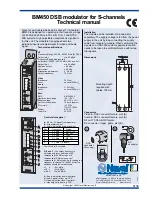
41CL User Manual
© 2019, Systemyde International Corporation
43
Special MMU Functions
The Special MMU Functions allow the user to enable and disable the MMU translation
circuitry for the Operating System pages (0-3 and 5). Normally these pages are never
mapped by the MMU, for obvious reasons. But users wanting to experiment with an alter-
native Operating System can use the
MAPEN
command to enable the special MMU
translation circuitry.
If the new Operating System uses the same register assignments and calling conventions,
then the
MAPDIS
command can be used from the modified Operating System to revert to
the native Operating System.
Unlike the normal MMU enable bit, the enable bit for the special MMU operation is not
preserved when the calculator is turned off. This provides a fail-safe way to restore the
native Operating System.
The MMU storage locations for the Operating System pages (Pages 0-3) do not follow the
convention used for all other memory pages, and these pages do not support multiple
banks. The table below shows the MMU storage locations for Pages 0-3.
Physical Address
Contents
0x80400C
MMU register for Page 0
0x80401C
MMU register for Page 1
0x80402C
MMU register for Page 2
0x80403C
MMU register for Page 3
All of the MMU storage locations for Pages 0-3 must be initialized before executing the
MAPEN
function, because these registers are not initialized by the
MMUCLR
function.
This will preserve the MMU mapping for the Operating System when the calculator is
turned off, so that only the global enable needs to be set to restore the mapping function.
The individual enable bits for each page still apply, making it easy to map just part of the
Operating System.
MAPDIS
Executing
MAPDIS
(
Disable Special MMU Mapping
) clears the special MMU enable bit
inside the NEWT microprocessor, which automatically restores the native Operating Sys-
tem. Since this function will normally be executed from a modified Operating System, the
function automatically returns using the normal 41C function call/return convention, in
case the modified Operating System uses a different convention.
















































